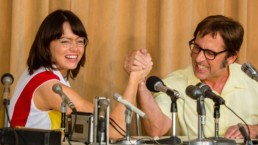‘Battle of the Sexes’ Review: This Famous Tennis Match is a Timely Message on Misogyny
As Billie Jean King, Emma Stone is already beginning the Awards chatter.
In 1973, 29-year-old Women’s tennis champion Billie Jean King was publicly challenged to a match by former Men’s tennis champion and ego-centric chauvinist, 55-year-old Bobby Riggs.
What was on the line for this playful yet all-but patronizing match differed for each athlete. For the self-obsessed showman, Riggs looked to reaffirm not only his own greatness but the unequivocal superiority of male athletes over female athletes.
For King, however, the outcome of this match was anything but light-hearted– she was fighting on behalf of women everywhere to gain the respect from male counterparts not only in the sport of tennis but in daily life. The famous match, which was broadcast around the world by ABC and to this day remains one of the highest-watched sports events of all time, is the subject of Battle of the Sexes, directed by the filmmakers of Little Miss Sunshine and starring Emma Stone as the steely-focused King and Steve Carell as the piggish Riggs.
Not-so-side note: if this premise of a misogynistic media-ham belittling women in the public eye for his own gains sounds strangely familiar to the headlines that dominated the American news-cycle during last year’s presidential election, you wouldn’t be wrong. That makes this tennis drama as timely as it is a necessary a reflection of how far we’ve come and how far we still have to go in securing equal rights for all.
Battle of the Sexes uses the tennis match as a vehicle to tell a much larger story that centers around King and her struggle for acceptance and equality in the sport. Stone is more than ready and game to slip into King’s court shoes, exuding a strong inner confidence in the film’s opening. Here, King, the reigning champion of the official Women’s league, is met with the flippant sexism of being told the Women’s prize will be a smaller purse than the Men’s from league President Jack Kramer (Bill Pullman). Not thinking twice, she drops out to form her own tournament, with hurt but unshaken confidence carrying her onward. The film goes deeper into King’s backstory when it’s revealed that she is doing this as a closeted yet married woman at a time when LGBTQ rights were significantly less than they are today.
Like a tennis player who knows when to soften a backhand lob or directly nail a line hit, Emma Stone as Billie Jean King is exacts her emotions with precision, pitting between moments of triumph and defeats in self-acceptance.
Coming off of last year’s Best Actress Oscar win for La La Land, Emma Stone as Billie Jean King is effortlessly good, covering all spots on the emotional court that this character demands. She plays the stone-faced and determined competitor as much as the insecure reluctant hero and everything in between. Like a tennis player who knows when to soften a backhand lob or directly nail a line hit, Emma Stone as Billie Jean King is exacts her emotions with precision, pitting between moments of triumph and defeats in self-acceptance.
Battle of the Sexes alternates with Riggs’ B-story, as he comes to terms with being once a winner but now a debilitated gambler with trust issues. The filmmakers develop Riggs into a man suffering from his own insecurities and Steve Carell’s trademark “lovable-in-spite-of-himself” character work makes Riggs not your stereotypical “villain.”
The performances and story arc make Battle of the Sexes a universally appealing film but it’s the lush and beautiful cinematography, compositions, and mood-building that directors Valerie Faris and Jonathan Dayton have created that make this an aesthetically strong and greatly packaged one. But what else would you expect from the filmmakers of Little Miss Sunshine who won audiences over in that Sundance classic? The message behind Sexes, like Sunshine, strives to strip away facade and inaccuracy in order to expose the human condition and a love of people for who they really are.
“Battle of the Sexes” is rated PG-13 for some sexual content and partial nudity. 121 minutes. In select theaters Friday.
Ryan Rojas
Ryan is the editorial manager of Cinemacy, which he co-runs with his older sister, Morgan. Ryan is a member of the Hollywood Critics Association. Ryan's favorite films include 2001: A Space Odyssey, The Social Network, and The Master.


